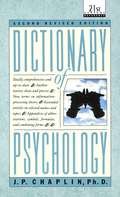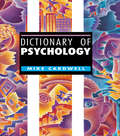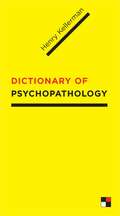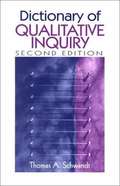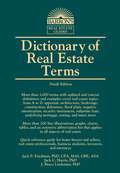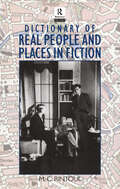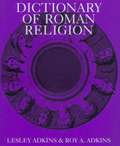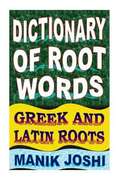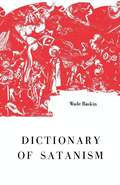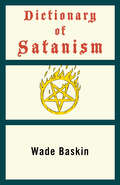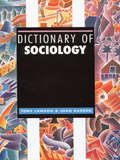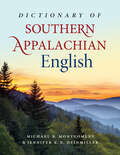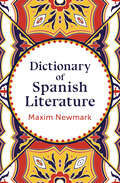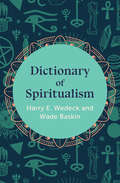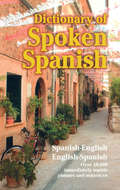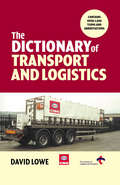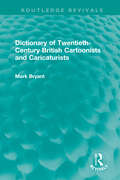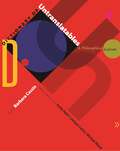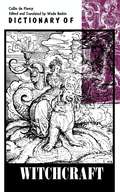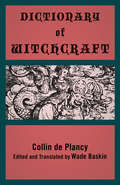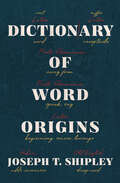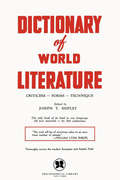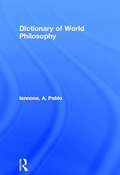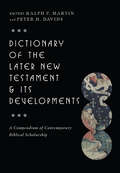- Table View
- List View
Dictionary of Psychology
by J. P. ChaplinWritten in clear, precise, jargon-free language, this complete, up-to-date dictionary includes definitions of psychology terms and those from related disciplines including psychoanlysis, psychiatry and biology as well as parapsychology.From the Paperback edition.
Dictionary of Psychology
by Mike CardwellFirst Published in 2001. Routledge is an imprint of Taylor & Francis, an informa company.
Dictionary of Psychopathology
by Henry KellermanPsychologists, psychiatrists, social workers, psychiatric nurses, theoreticians, practitioners, and other allied professionals who together represent the entire arc of the mental health field must be versed in psychopathology, the study of mental and emotional phenomena, abnormal psychology, and specific symptoms and behaviors. Building a reference that speaks to all of these professions and subjects, Henry Kellerman assembles the first dictionary to focus exclusively on psychopathology, featuring more than two thousand entries (over fifteen hundred primary and more than five hundred subentries) on specific symptoms and disorders, general syndromes, facets of personality structure, and diagnosis. He also includes a sampling of benchmark contributions by theoreticians and researchers that cover the history of psychopathology. These contributions reflect those of a psychodynamic nature as well as cognitive and behavioral approaches, and represent the relatively new field of neuropsychoanalysis as well. This branch of neuroscience is concerned with the relation between the brain and the mind, specifically with reference to brain architecture and function.Monitored by a distinguished editorial board, the Dictionary of Psychopathology mostly adheres to the latest DSM nomenclature while also retaining useful residual diagnoses of previous DSM formulations, as well as diagnostic formulations outside of traditional nosologies. The aim of the Dictionary is to broadly contribute to the synthesis of psychopathology.
Dictionary of Qualitative Inquiry
by Thomas A. SchwandtSchwandt provides description and references for many terms used in qualitative inquiry.
Dictionary of Real Estate Terms (Barron's Business Dictionaries)
by Jack C. Harris Jack P. Friedman J. Bruce LindemanNeed to know real estate jargon? This quick-reference guide can help.Home buyers and sellers, as well as real estate professionals, investors, and attorneys can rely on this quick-reference source. More than 3,000 terms and definitions cover topics that include appraisal, architectural styles, brokerage, construction, development, environmental finance, mortgage types, zoning regulations, and much more. Includes graphs, charts, and line art.
Dictionary of Real People and Places in Fiction
by M.C. RintoulFascinating and comprehensive in scope, the Dictionary of Real People and Places in Fiction is a valuable source for both students and teachers of literature, and for those interested in locating the facts behind the fiction they read. In a single, scholarly volume, it provides intriguing insight into the real identity of people and places in the novels of over 300 American and British authors published in the nineteenth and twentieth centuries.
Dictionary of Roman Religion
by Lesley Adkins Roy A. AdkinsBreaking with the long tradition of presenting classical Roman mythology as a reworked and diluted version of its Greek counterpart, offers entries ranging from short definitions to short essays on both the primitive, native aspects and the cosmopolitan fertility of mythology incorporated from Judaism, Druidism, Mithraism, and other cultures. Includes deities and their kin, festivals, events, writers, places and buildings, cult objects, burial rites, and other aspects. Well cross-referenced, and most entries are referenced to the bibliography. Includes a glossary without pronunciation. Annotation c. by Book News, Inc., Portland, Or.
Dictionary of Root Words Greek and Latin Roots: English Word Power
by Manik JoshiDictionary of Root Words Greek and Latin Roots
Dictionary of Satanism
by Wade BaskinA handy, comprehensive guide to a wide range of topics relating to the awesome power and cult of Satan, in myriad forms and under many different names, from ancient times to the present. Distilled from hundreds of reliable sources, both religious and secular, the entries include men and movements, orders and objects, rites, rituals, incantations, events, legends, and occult practices that have fascinated the mind of man through the ages. It also contains entries relating to a host of unorthodox beliefs and irrational acts, such as the murder of Sharon Tate, which have only recently come to light. The simple manner in which even the most abstruse topics are handled is certain to open the mysterious world of darkness to readers with no prior knowledge of the occult and to intrigue and inform those who seek to extend their knowledge of the subject. Wade Baskin (1924–1974) was an American author and translator. Known for his extensive list of books on the occult and for his studies of linguistics and philosophy, Baskin also taught at Southeastern Oklahoma State University, where he was inducted into the Faculty Hall of Fame. He was the editor of Classics in Education.
Dictionary of Satanism: Dictionary Of Satanism, Dictionary Of Witchcraft, And Dictionary Of Pagan Religions
by Wade BaskinA comprehensive A-to-Z reference guide to the terms, concepts, influential figures, and key events associated with Satanism. Dictionary of Satanism is a concise yet wide-ranging reference guide for the casual reader or student of satanic practices. It features essential information on the important concepts, issues, people, places, and events associated with Satanism, as well as the myriad forms and names that satanic worship has taken from ancient times to the present. Author Wade Baskin also covers a host of unorthodox beliefs and irrational acts, such as the murder of Sharon Tate. Distilled from hundreds of reliable sources, both religious and secular, the entries include men and movements, orders and objects, rites, rituals, incantations, legends, and occult practices that have fascinated the mind of man through the ages.
Dictionary of Sociology
by Joan Garrod Tony LawsonWith full coverage of areas such as social stratification, crime and deviance, culture and identity, mass media, power and politics, and religion, the Dictionary of Sociology is designed to give the reader a sound introduction to the debates and issues in which sociologists engage. Cross references abound, while illustrations and tables further aid understanding and the A-Z format makes the book exceptionally easy to use.
Dictionary of Southern Appalachian English
by Michael B. Montgomery & Jennifer K. N. HeinmillerThe Dictionary of Southern Appalachian English is a revised and expanded edition of the Weatherford Award–winning Dictionary of Smoky Mountain English, published in 2005 and known in Appalachian studies circles as the most comprehensive reference work dedicated to Appalachian vernacular and linguistic practice. Editors Michael B. Montgomery and Jennifer K. N. Heinmiller document the variety of English used in parts of eight states, ranging from West Virginia to Georgia—an expansion of the first edition's geography, which was limited primarily to North Carolina and Tennessee—and include over 10,000 entries drawn from over 2,200 sources. The entries include approximately 35,000 citations to provide the reader with historical context, meaning, and usage. Around 1,600 of those examples are from letters written by Civil War soldiers and their family members, and another 4,000 are taken from regional oral history recordings. Decades in the making, the Dictionary of Southern Appalachian English surpasses the original by thousands of entries. There is no work of this magnitude available that so completely illustrates the rich language of the Smoky Mountains and Southern Appalachia.
Dictionary of Spanish Literature
by Maxim NewmarkA wide-ranging, accessible reference for students of Spanish or Spanish American literature covering fiction, poetry, drama, anonymous classics, and more. In Dictionary of Spanish Literature, Maxim Newmark presents a concise yet informative overview of significant authors and works in Spanish literature, as well as important topics and terminology. Outstanding Spanish literary critics, the major movements, schools, genres, and scholarly journals are also included. An essential resource for any Spanish literature scholar, this volume provides an expansive overview of the topic, spanning both centuries and continents.
Dictionary of Spiritualism
by Wade Baskin Harry E. WedeckAn encyclopedic survey of esoteric traditions, supernatural phenomena, and spiritualist thinkers from ancient mythmakers to present-day gurus.The concept of the supernatural applies to a variety of occurrences that are beyond the grasp of typical human consciousness. Supernaturalism encompasses the animate and the inanimate; the physical and the metaphysical; Heaven, Hell and all that is between. This reference guide offers an in-depth survey of these phenomena, as well as the terminology and personalities connected to various spiritualist traditions that have sought to understand them.Dictionary of Spiritualism ranges across the world, and from antiquity to the twentieth century, touching on a multiplicity of legends, mythologies, beliefs, and supernatural events that are far beyond mortal comprehension.
Dictionary of Spoken Spanish
by U. S. War DeptThis is a complete, unabridged republication of a Dictionary of Spoken Spanish, which was specially prepared by nationally known linguists for the U.S. War Department (TM#30-900).It is compiled from spoken Spanish and emphasizes idiom and colloquial usage in both Castilian and Latin American areas. More than 16,000 entries provide exact translations of both English and Spanish sentences and phrases; as many as 60 idioms are listed under each entry. This is easily the largest list of idiomatic constructions ever published.Travelers, business people, and students who are interested in Latin American studies have found this dictionary their best source for those expressions of daily life and social activity not usually found in books. More than 18,000 idioms are given, not as isolated words that you have to conjugate or alter, but as complete sentences that you can use without change.A 25-page introduction provides a rapid survey of Spanish sounds, grammar, and syntax, with full consideration of irregular verbs. It is especially apt in its modern treatment of phrase and clause structure. A 17-page appendix gives translations of geographical names, numbers, national holidays for Spanish countries, important street signs, useful expressions of high frequency, and a unique 7-page glossary of Spanish and Spanish-American foods and dishes.
Dictionary of Statistics & Methodology: A Nontechnical Guide for the Social Sciences
by W. Paul VogtThis reference provides definitions of commonly used statistical terms in easily-understood language.
Dictionary of Transport and Logistics
by David LoweThis unique, single volume dictionary aims to make sense of the language of generic terms, jargon, abbreviations and management buzzwords, to say nothing of the legal terms and definitions, that has grown up around the transport and logistics industries. -Provides clear, unambiguous definitions of some 3,000 terms,-Endorsed by the Chartered Institute of Logistics and Transport. -UK and EU terms covered;-A work of reference for everyone in the sector, from newcomers to senior managementDavid Lowe has been actively involved in the road transport industry for more than 40 years, gaining 'hands'on' road haulage and logistics experience and a detailed knowledge of UK and EU transport law. He is the author of The Transport Manager's and Operator's Handbook now in it's 31st year of publication, and has written many other books, guides, study manuals and magazine articles on transport and logistics. He is an active member for the Chartered Institute of Logistics and Transport and is Champion of the Institute's Freight Transport Special Interest Group. He is also a Liveryman of the Worshipful Company of Carmen and a Freeman of the City of London. Freight transport and logistics operations have become so technically sophisticated that a whole language of generic terms, jargon, abbreviations and managements to say nothing of the legal terms and definitions, has been generated. Vehicle manufacturers now strive to find new terms to describe technical achievements and new products, while legislators give such long titles to new regulations that they have to be identified with acronyms. Furthermore, recent developments in logistics and supply chain concepts have spawned a plethora of management concepts and new IT terms, initials and acronyms. The aim of this dictionary is to identify these terms and, in clear unambiguous English, provide accurate descriptions and definitions. With some 3,000 terms and abbreviations and acronyms included this is the most comprehensive dictionary of its type currently available. It will prove invaluable to readers from all sectors and at all levels from students and junior staff to top management, all of whom may need to source the meaning or relevance of industry terms not generally found in standard English language dictionaries.
Dictionary of Twentieth-Century British Cartoonists and Caricaturists (Routledge Revivals)
by Mark BryantBritish cartoonists and caricaturists are renowned worldwide. Originally published in 2000, this indispensable handbook offers a unique ‘who’s who’ of all the major artists working in Britain in the twentieth century and contains nearly 500 entries. Extensively illustrated, the book provides information on the work of artists such as Steve Bell, Gerald Scarfe, Posy Simmonds, Ronald Searle, Trog, mac and Larry as well as such past masters as David Low, Vicky, H. M. Bateman, Illingworth, Heath Robinson and more. The dictionary concentrates primarily on political cartoonists, caricaturists and joke or ‘gag’ cartoonists, actively working for the main Fleet Street national dailies and weeklies from 1900 to 1995. Each entry is cross-referenced and provides a concise biographical outline with an account of the artist’s style, influences and preferred medium. Where relevant the entry includes suggestions for further reading and notes solo exhibitions, books illustrated and works held in public collections. The Dictionary of Twentieth-Century British Cartoonists and Caricaturists offers an insight into the lives of satirical artists working during a century that provoked cartoonists and caricaturists to a pitch of comic and artistic invention that has rarely been matched.
Dictionary of Untranslatables: A Philosophical Lexicon (Translation/Transnation #35)
by Barbara CassinCharacters in some languages, particularly Hebrew and Arabic, may not display properly due to device limitations. Transliterations of terms appear before the representations in foreign characters.This is an encyclopedic dictionary of close to 400 important philosophical, literary, and political terms and concepts that defy easy—or any—translation from one language and culture to another. Drawn from more than a dozen languages, terms such as Dasein (German), pravda (Russian), saudade (Portuguese), and stato (Italian) are thoroughly examined in all their cross-linguistic and cross-cultural complexities. Spanning the classical, medieval, early modern, modern, and contemporary periods, these are terms that influence thinking across the humanities. The entries, written by more than 150 distinguished scholars, describe the origins and meanings of each term, the history and context of its usage, its translations into other languages, and its use in notable texts. The dictionary also includes essays on the special characteristics of particular languages--English, French, German, Greek, Italian, Portuguese, Russian, and Spanish.Originally published in French, this one-of-a-kind reference work is now available in English for the first time, with new contributions from Judith Butler, Daniel Heller-Roazen, Ben Kafka, Kevin McLaughlin, Kenneth Reinhard, Stella Sandford, Gayatri Chakravorty Spivak, Jane Tylus, Anthony Vidler, Susan Wolfson, Robert J. C. Young, and many more.The result is an invaluable reference for students, scholars, and general readers interested in the multilingual lives of some of our most influential words and ideas.Covers close to 400 important philosophical, literary, and political terms that defy easy translation between languages and culturesIncludes terms from more than a dozen languagesEntries written by more than 150 distinguished thinkersAvailable in English for the first time, with new contributions by Judith Butler, Daniel Heller-Roazen, Ben Kafka, Kevin McLaughlin, Kenneth Reinhard, Stella Sandford, Gayatri Chakravorty Spivak, Jane Tylus, Anthony Vidler, Susan Wolfson, Robert J. C. Young, and many moreContains extensive cross-references and bibliographiesAn invaluable resource for students and scholars across the humanities
Dictionary of Witchcraft
by Collin De PlancyDictionary of Witchcraft is a must-have resource for anyone interested in witchcraft, pagan religions, and the occult. This historical dictionary was the first reference work to seriously document superstitions, manifestations, magic, and superstitions. The author’s interest was to compile a vast amount of matter that would interest, entertain and instruct others. This dictionary was consulted by some of the greatest Romantic writers, notably by Hugo. Collin de Plancy followed the tradition of many previous demonologists of cataloguing demons by name and title of nobility, as it happened with grimoires like Pseudomonarchia Daemonum and The Lesser Key of Solomon among others. It is considered a major work documenting beings, characters, books, deeds, and causes which pertain to the manifestations and magic of trafficking with Hell; divinations, occult sciences, grimoires, marvels, errors, prejudices, traditions, folktales, the various superstitions, and generally all manner of marvelous, surprising, mysterious, and supernatural beliefs. This edition was translated and introduced by occultist Wade Baskin. Collin de Plancy (1794–1881) was a French occultist, demonologist, author, and translator. His best-known work, Dictionary of Witchcraft (Dictionnaire Infernal), was published in 1818 but didn’t receive wide acclaim until 1863 when a set of 69 illustrations by Louis Breton were added. Later in life, de Plancy converted to Catholicism and focused his studies on Catholic histories and mysticisms.
Dictionary of Witchcraft: Dictionary Of Satanism, Dictionary Of Witchcraft, And Dictionary Of Pagan Religions
by Collin de PlancyThe original and authoritative A-to-Z reference guide to witchcraft, paganism, and magic, compiled by the famed nineteenth-century French occultist. Following its original publication in 1818, Collin de Plancy&’s Dictionnaire Infernal became a landmark study of witchcraft, pagan religions, and the occult. The first reference work to seriously document manifestations, magic, and superstitions, this historical dictionary details beings, characters, books, deeds, and causes that pertain to the manifestations and magic of trafficking with Hell, as well as divinations, occult sciences, grimoires, marvels, errors, prejudices, traditions, folktales, the various superstitions, and all manner of marvelous, surprising, mysterious, and supernatural beliefs. A significant influence on the Romantic literary movement and notably consulted by author Victor Hugo, it remains an essential text for any student of the dark arts or demonology.
Dictionary of Word Origins (Barnes And Noble Digital Library)
by Joseph T ShipleyThis extensive reference volume presents the etymological history of thousands of English words. The story of how words come to be is the story of how humans think, and how we fashion our civilizations. Words can be the product of long and intertwining histories, migrations from other languages, or new coinages of science or slang. This diversity of origins is part of what gives the English language its beauty and power. In Dictionary of Word Origins, etymologist Joseph T. Shipley provides a fascinating window into the evolution of modern English, from the onomatopoetic aspect of &“abash&” to the animalistic origins of &“zodiac.&”
Dictionary of World Literature
by Joseph T. ShipleyThis book gives you the background of literature and the theatre. It defines, clearly and crisply, the terms used in the literary arts and in their criticism. It outlines the history of criticism in the various lands. It explains the various literary schools, varieties of play, methods of theatre production; types of poetry, fiction, history, biography--the puppet show; the dance: Providing A Rich Compendium Of All You Need To Know When You Approach A Novel Or A Poem Or A Play. This is an amazingly thorough reference work which must prove of enormous value to the theatre worker, professional or scholar everywhere; for the librarian, teacher, and critic, an essential tool. --George Freedley, President, Theatre Library Association. To the delight and relief of librarians and students a gap in the reference collection has been bridged successfully, at last! --William A. Fitzgerald, Past President, Catholic Library Association.
Dictionary of World Philosophy
by A. Pablo IannoneThe Dictionary of World Philosophy covers the diverse and challenging terminology, concepts, schools and traditions of the vast field of world philosophy. Providing an extremely comprehensive resource and an essential point of reference in a complex and expanding field of study the Dictionary covers all major subfields of the discipline.Key features:* Cross-references are used to highlight interconnections and the cross-cultural diffusion and adaptation of terms which has taken place over time* The user is led from specific terms to master entries which provide valuable historical and cultural context* Each master entry is followed by at least two suggestions for further reading on the subject, creating a substantial bibliography of world philosophy* References extend beyond philosophy to related areas such as cognitive science, computer science, language and physicsSubdisciplines covered include:* aesthetics * ethics * sociopolitical philosophy * the philosophy of law * epistemology * logic * the philosophy of science * the philosophy of mind * the philosophy of culture and history * metaphysics * the philosophy of religionEntries are drawn from West Africa, Arabic, Chinese, Indian, Japanese, Jewish, Korean, Latin American, Maori and Native American philosophy including the important and so far largely neglected instance of Pre-Hispanic thought: Nahua philosophy.
Dictionary of the Later New Testament & Its Developments: A Compendium of Contemporary Biblical Scholarship (The IVP Bible Dictionary Series)
by Ralph P. Martin Peter H. DavidsChristianity Today'sDictionary of the Later New Testament & Its DevelopmentsDictionary of the Later New Testament & Its DevelopmentsDictionary of Jesus and the GospelsDictionary of Paul and His Letters
